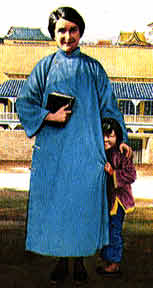
I got on my computer this morning before my work out and noted that the day listed for Morning Prayer today is in honor of Gladys Aylward and my first thought was who the heck is she and why should I pray for her? In the lessons on the Mission St. Clare's website there was the picture of her and the story.written by James Kiefer.
Gladys Aylward, Missionary to China 3 January 1970, which is the date she died. As I read her life- I thought I have heard this story before and when Kiefer refers to the Chinese Mandarin of Yangchen- I could not get the image of Robert Donut out of my mind. It was his last role before he died and he played the Mandarin the in the Movie Inn of 6th Happiness and Ingrid Bergman played the inadequate woman who rises to the challenge in saving the children in that movie. Imagine my surprise when I found out that movie which I first saw back in the 50's with the orphans singing "This Old Man" was about her life. I think I was 12 when I first saw it going with the EYC- Episcopal Young Churchmen (Youth Group) where we got an obligatory lecture of how bad the Chinese were treated by the Japanese and how the Godless communists had not allowed the plucky missionary back into the country and how she was setting up an orphanage under the enlightened leadership of Chiang Kai Shek on Taiwan and we were to pray for the day when the Generalissimo and his American Educated wife would be unleashed to win back China for Christ..I loved the movie because it fed into my own racism about how we whites needed to help our little yellow brothers.
Later on I was to learn that our governments involvement was, shall we say, more complex. I tended to look back at this movie and in my new sophistication dismissed the movie as right wing fantasy. Except there is a truth buried in the movie about a woman of faith. The movie has a great many inaccuracies and Gladys Aylward herself was furious with the liberties taken.
I will get the movie from Netflix and see it again and this time try to read the book on which it was based.. This is a gutsy woman who trusted in a power greater than herself. She lived her life as if the "word becomes flesh" was true in her everyday life. She became a Chinese citizen because she wanted to share their lives. The movie tended to romanticize the story. The movie does the same thing that the institutional church tends to do when we talk about Jesus and "saints", we tend to go with the cardboard cut-out legend we create rather than inconvenient facts. There is a line from the John Ford movie The Man Who Shot Liberty Valance which I saw a couple years after The Inn of 6th Happiness "No, sir. This is the West, sir. When the legend becomes fact, print the legend."
This is from the book on which the Bergman film was based :The Small Woman by Alan Burgess, 1957, revised addition, 1969]
Gladys returned from China to England in the late 1940's an unknown missionary. Alan Burgess, who was producing a series on war heroes for the BBC radio, visited her in the hope a missionary could tell him about heroes she had heard about in China. Well, no, she said in her rusty English. She didn't actually know any heroes.
"What about yourself?" he asked the little woman half-heartedly. "Did you have a scrape or two?"
"I doubt people who listen to BBC would think I've done anything interesting."
"Didn't you even come into contact with the Japanese invaders?" he pressed.
"Yes," she answered cryptically. It wouldn't be very forgiving if she told Alan Burgess the Japanese had shot her down in a field outside Tsechow. Bombed her too. In Yangcheng. Strafed her near Lingchuang too. Smashed her on the noggin once with a rifle butt too. Finally put a price on her head: dead or alive. "Some Japanese are very nice, you know," she volunteered.
"Apparently your life in China was rather sheltered," he grunted dryly.
Gladys had to offer the poor man something. "I did take some children to an orphanage near Sian."
"You don't say?" he grumbled, not hiding disappointment. "Kids? To an orphanage?"
"Yes, we had to cross some mountains."
Burgess perked up. "Real mountains?"
"Yes, I believe you would call them real mountains. The journey was made more difficult because we couldn't walk on the main trails. Oh, and then we had to get across the Yellow River too."
"Isn't that the notorious river that drowns so many it's called 'China's Sorrow'?"
Burgess was more and more aghast as Gladys detailed her trek. His voice choked. "You ran out of food? You had no money? Just you and 100 kids - many of whom were toddlers - trekked for one month across mountains, across the Yellow River, ducking Japanese patrols and dive bombers? And at Sian you were diagnosed with typhus and pneumonia and malnutrition? Yes, Miss Aylward, I think people who listen to BBC would think you've done something interesting…"
Today is a good day to remember.
No comments:
Post a Comment